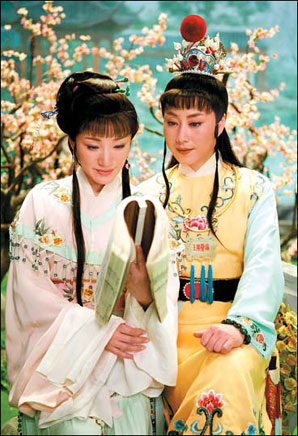
Baoyu, played Zheng Guofeng, and Daiyu, played by Wang zhiwen, read the banned book Romance of the West Chamber in the classic version of A Dream of the Red Chamber. (Photo: China Daily)
"The younger sister Lin falls from the sky, like a light cloud just flying from the back of the mountain." It is probably one of the most popular arias from the Yueju Opera, A Dream of the Red Chamber.
Adapted from Cao Xueqin's novel of the same title, A Dream of the Red Chamber is by far the most popular show in Yueju Opera. It focuses on a love story and the decline of feudal families. Two crossed lovers are destined by fate to be apart.
The story begins with the beautiful Lin Daiyu, who moves in with her grandmother's family after the death of her mother. There, Daiyu meets numerous relatives, one of whom is Jia Baoyu, her mother's nephew. Baoyu was borne with a jade tablet and so, is treated like a fragile egg and is spoiled by his grandmother. He often spends his time with his female cousins and maids instead of concentrating on his studies. One of the cousins he hangs around with is Xue Baochai. Baoyu and Daiyu eventually fall in love with each other, but Daiyu is not very well liked by the family, and instead, the family members favor Baochai.
Ever since it was filmed and released throughout the country in 1962, it has become China's best-selling opera film. The play, starring Xu Yulan as Baoyu and Wang Wenjuan as Daiyu, appealed not only to regular fans in East China's Zhejiang, Jiangsu and Shanghai where the Yueju Opera was born, but people from all over the country.
Wei Xiangdong, in his early thirties, grew up with the melodies of the play as he was raised by his grandmother who loved the soundtrack.
A former host of the local opera channel at Shanghai Cable TV and now at CCTV, Wei rarely missed the Yueju Opera shows and tried to record most of them. But he never dared to think that one day he would produce and direct A Dream of the Red Chamber himself.
In 2006, the Central News Documentary Film Company planned to produce a series of popular repertories to preserve the dying local operas. Gao Feng, director of the company who is also the vice-president of CCTV, immediately thought of Wei to drive the project.
The original plan was to revive the 1962 movie with a cast of young performers. But in early 2000, the Shanghai Grand Theater produced a version featuring new tunes accompanied by the symphonic orchestra. Then a reporter with Shanghai Cable TV, Wei was so impressed by the new production that he recorded the full-length play and made it into a rough movie.
"Though I grew up with that classic version and can sing all the arias, I was fascinated by the new one immediately," says Wei.
"If say, the 1962 movie is my sister, the 2000 production is my wife."
Reserving all the scenes, details and arias of the 1962 movie, the new-filmed classic version features all the major scenes such as Baoyu and Daiyu reading the banned book Romance of the West Chamber; Daiyu burying the fallen flowers; Daiyu burning her love poems manuscripts before her death; Baoyu mourning Daiyu's Death and Baoyu leaving home to become a monk.
Zheng Guofeng, disciple of Xu Yulan plays Jia and Wang Zhiwen, disciple of Wang Wenjuan stars as Lin.
The symphonic version is almost the revival of that 2000 production, starring Zhao Zhigang as Jia and Fang Yafen as Lin. It features many popular Yueju actresses such as He Ying and Tao Huimin who have been away from the stage for years but remained in Yueju Opera fans' hearts.
"You can expect nothing less than powerful symphonic music, highly elaborate sets, fashionable costumes and an unforgettable performance by a stellar cast," says Wei.
Both films premiered in Shanghai at the end of 2007. The classic version ran for 150 shows at the Shanghai Film Center. According to its staff, the movie even sold better than Ang Lee's Lust Caution.
Now the classic version will run 10 nights at Beijing's Capital Film from May 9 and followed by 10 nights of the symphonic edition from May 20.
(China Daily May 6,2008)